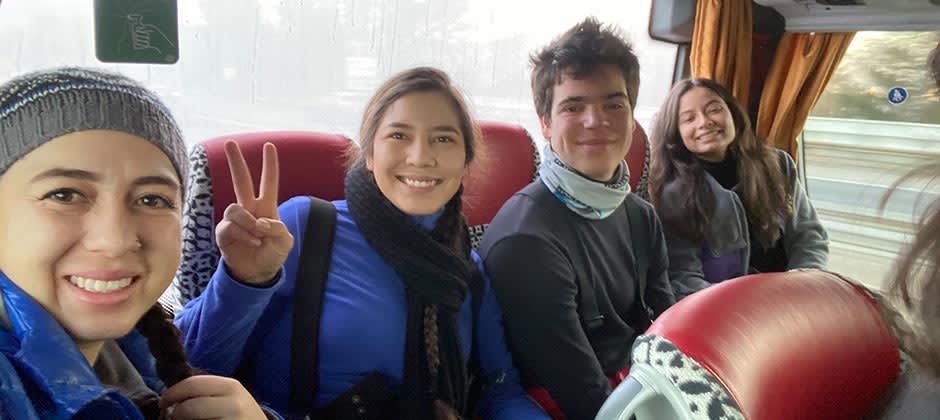Tips for Studying Abroad in the Netherlands
As a modern, egalitarian society with a rich cultural heritage and liberal social policies, it’s no wonder the Netherlands is one of the most popular European destinations to study abroad. However, no transition abroad is completely seamless, so we have compiled a list of tips and suggestions for prospective and new students alike to make the journey even easier.
- Study Abroad in the Netherlands
- Study Abroad in Europe
- Applying to Study Abroad
- During Study Abroad
- Deciding Where to Study

As a modern, egalitarian society with a rich cultural heritage and liberal social policies, it’s no wonder that going to study abroad in the Netherlands is one of the most popular options for international students.
The number of international students studying in the Netherlands continues to grow. If you choose to study abroad in the Netherlands, you will have access to a top-notch education in the first non-English-speaking country to offer higher education conducted in English for foreign students.
You will meet new people and feel at home right away while studying abroad in the Netherlands, a country known for its beautiful landscapes and friendly citizens. Even so, no transition abroad is seamless, so we have compiled a few tips and suggestions to make the process easier for new and prospective students planning to study abroad in the Netherlands.
Choose Your City

If you're looking to study abroad in the Netherlands, we suggest: stay true to yourself and choose a destination that you really have a strong connection to or a good feeling about, rather than just being told that it is beautiful or exotic.
If you're planning to study in the Netherlands, you'll be able to enjoy the beautiful and lively cities all across the country. Studying abroad in the Netherlands will give you access to enjoy its historic and artistic vibe. The most famous Dutch city is Amsterdam where you can take your bike for a ride along the winding canals, check out the world’s largest Van Gogh collection at the Van Gogh Museum, or just relax in one of the many cozy “brown cafes.”
Or, trade in Amsterdam’s historic, 17th century architecture for Rotterdam’s more modern skyline. Rotterdam is a popular city for international students who study abroad in the Netherlands as it is the country's second largest city. Rotterdam houses many of the Netherlands’ most impressive architecture, including the Erasmus Bridge, Euromast, and the Maastoren.
If you are feeling adventurous, you can also try out some smaller, but still student-friendly cities, such as Breda or Groningen. Studying in the Netherlands is the ideal way to obtain an understanding of traditional Dutch culture while also interacting with a large international student population.
Choose Your Program
Some students also prefer to choose their program or university first, and will settle down wherever their dream education can be found. Choosing to study abroad in the Netherlands means you have access to hundreds of English-language courses and programs across numerous Netherlands universities, and you definitely can find something to suit your interest.
Netherlands universities utilize a Problem Based Learning system, which trains students to analyze and solve practical problems. Both of our student ambassadors cite this as one of the key reasons why they chose to study abroad in the Netherlands, as it is preparing them for future careers in their fields. The Netherlands also participates in Erasmus+, an education program run by the EU, designed to promote education. It supports students from all backgrounds and ages in gaining experience and knowledge by studying abroad in the Netherlands.
Among the most popular programs to study abroad in the Netherlands, why not try economics, environmental science, or fashion management? A combination of theoretical and practical learning will create a unique education that can't be matched, especially in the fields listed above.
Thinking of studying abroad in the Netherlands?
Click below to check out our handy study guide!
Prepare Your Application
Once you have decided on where to live or what to study abroad in the Netherlands, it’s time to prepare your application. Depending on your home country, some of the admission requirements may be different, so check well in advance of the due date to make sure you complete your application in its entirety.
In most cases, you will need to have received a diploma upon completion of your secondary education. Additionally, you will also have to prove your English language skills by passing an official English language test before studying in the Netherlands.
After you submit all of the necessary documentation, you can begin researching scholarship opportunities and requirements to apply for a visa while you wait for your admission decision.
Find Accommodation
After you have been accepted to your dream program, it’s time to start thinking about your move to the Netherlands. Your first step will be to find housing. On this one, you’ll have to be quick!
It is difficult to find affordable housing while studying abroad in the Netherlands, and many Netherlands universities do not guarantee student housing. Therefore, it’s imperative to plan in advance to make sure you find suitable accommodation. Checking out local rental websites for information about available apartments, networking with current students for more resources, or staying with a host family can all be helpful in finding a suitable place to live while studying in the Netherlands.
Some top student tips for newcomers include: seeking housing before studying in the Netherlands, including asking the university, joining Facebook groups, and inquiring with other students. If you’re planning to move and study abroad in the Netherlands, read the full list here to get a head start on finding housing.
Settle into the Culture

No matter where you live, if you are away from home, you will likely experience some degree of culture shock. It's important to recognize the stages of culture shock and understand that feeling the way you do while studying in the Netherlands is completely normal.
The good news is that lots of international students agree that studying abroad in the Netherlands is a good decision because the country has a multicultural, inclusive culture in which more than 150 nationalities live together. The Dutch people are open and interested in people from other countries and cultures, and they are very good at communicating in English.
In fact, the Netherlands ranks as the top country for English proficiency for non-native speakers. As a result, it will be easier to adapt to the new cultural environment when studying abroad in the Netherlands.
If you will be studying in the Netherlands, learn about the Dutch culture before you arrive, including the following traditions and practices that you should be aware of. Don’t forget to look up some faux-pas, as well, in order to avoid an uncomfortable situation.
Don’t Forget to Have Fun!
Despite all the details to arrange in advance, once you are settled in, it's time to start enjoying your trip to study abroad in the Netherlands. A great way to meet new people and start assimilating into the culture is to put yourself out there, join activities, and visit the popular destinations around your new city to get yourself acquainted. The Markthal & Cube Houses in Rotterdam, the Van Gogh Museum and the Rijksmuseum in Amsterdam, and the De Haar Castle in Utrecht are all worthwhile sites to visit while studying in the Netherlands.
As Iona recalls her adventures while studying in the Netherlands, “each and every corner, be it man-made (as the majority is) or natural, [it] is worth exploring, enjoying and loving.” Or, when exploring his new home in Rotterdam, Mateusz describes it as “fantastic buildings, a variety of museums, restaurants and much more.”
You will make life-long memories and life-long friends in your journey to study abroad in the Netherlands, regardless of where you end up.

Author
The Keystone Team is comprised of experienced educators and advisors dedicated to providing valuable resources and advice to students all over the world.
Read related articles

Where Can TOEFL iBT Scores Take You?

Why I Chose to Study Engineering in Austria
